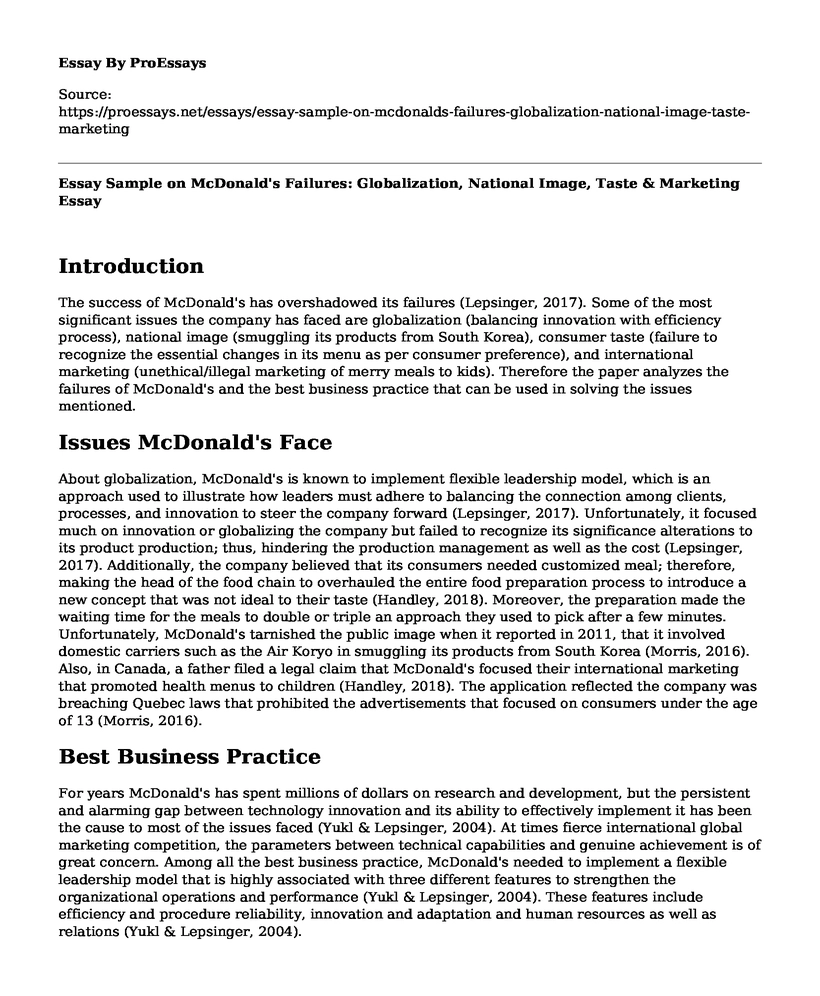Introduction
The success of McDonald's has overshadowed its failures (Lepsinger, 2017). Some of the most significant issues the company has faced are globalization (balancing innovation with efficiency process), national image (smuggling its products from South Korea), consumer taste (failure to recognize the essential changes in its menu as per consumer preference), and international marketing (unethical/illegal marketing of merry meals to kids). Therefore the paper analyzes the failures of McDonald's and the best business practice that can be used in solving the issues mentioned.
Issues McDonald's Face
About globalization, McDonald's is known to implement flexible leadership model, which is an approach used to illustrate how leaders must adhere to balancing the connection among clients, processes, and innovation to steer the company forward (Lepsinger, 2017). Unfortunately, it focused much on innovation or globalizing the company but failed to recognize its significance alterations to its product production; thus, hindering the production management as well as the cost (Lepsinger, 2017). Additionally, the company believed that its consumers needed customized meal; therefore, making the head of the food chain to overhauled the entire food preparation process to introduce a new concept that was not ideal to their taste (Handley, 2018). Moreover, the preparation made the waiting time for the meals to double or triple an approach they used to pick after a few minutes. Unfortunately, McDonald's tarnished the public image when it reported in 2011, that it involved domestic carriers such as the Air Koryo in smuggling its products from South Korea (Morris, 2016). Also, in Canada, a father filed a legal claim that McDonald's focused their international marketing that promoted health menus to children (Handley, 2018). The application reflected the company was breaching Quebec laws that prohibited the advertisements that focused on consumers under the age of 13 (Morris, 2016).
Best Business Practice
For years McDonald's has spent millions of dollars on research and development, but the persistent and alarming gap between technology innovation and its ability to effectively implement it has been the cause to most of the issues faced (Yukl & Lepsinger, 2004). At times fierce international global marketing competition, the parameters between technical capabilities and genuine achievement is of great concern. Among all the best business practice, McDonald's needed to implement a flexible leadership model that is highly associated with three different features to strengthen the organizational operations and performance (Yukl & Lepsinger, 2004). These features include efficiency and procedure reliability, innovation and adaptation and human resources as well as relations (Yukl & Lepsinger, 2004).
Conclusion
To conclude, a corporation such as McDonald's to prosper and survive in the domestic as well as international market, it needs to strengthen its attributes by initiating efficiency and reliability, products and services that are as per the clients' needs, purchase budget and collection time. Also, it needs to employ a high level of expertise, trust and coordination among all international and domestic retails and outlets. The relative operational norm of these properties is to determine issues and provide solutions as per the situation. For instance, innovation is an essential approach that solves the standards of the competitive marketing strategy by differentiating the goods and services with consumer preferences, product competitors, and the rate of production. Additionally, efficiency drives to cost-effective operational cost and the maintenance of low prices to retain consumers. Also, its human resources and relations need to motivate the personnel to extend the ideal relationship with international markets and ensure that the company operates as per the national brand identity as well as foreign market policies governing trade. In other words, the approach can be used in reframing the issues, integrating management and leadership roles through increasing awareness, adapting to systems thinking, and leading by example.
References
Handley, L. (2018, November 20). McDonald's is being sued by a father over 'illegal' marketing of Happy Meals to children. Retrieved from https://www.cnbc.com/2018/11/20/mcdonalds-is-being-sued-over-illegal-marketing-of-happy-meals.html
Lepsinger, R. (2017, August 14). 3 Companies That Failed to Adapt, And Where They Went Wrong. Retrieved from https://www.business2community.com/business-innovation/3-companies-failed-adapt-went-wrong-01895678
Morris, H. (2016, November 9). 10 countries where McDonald's is not welcome. Retrieved from https://www.telegraph.co.uk/travel/lists/the-countries-that-banned-mcdonalds/
Yukl, G., & Lepsinger, R. (2004). Flexible leadership: Creating value by balancing multiple challenges and choices. Hoboken, New Jersey, United States: John Wiley & Sons.
Cite this page
Essay Sample on McDonald's Failures: Globalization, National Image, Taste & Marketing. (2023, Mar 16). Retrieved from https://proessays.net/essays/essay-sample-on-mcdonalds-failures-globalization-national-image-taste-marketing
If you are the original author of this essay and no longer wish to have it published on the ProEssays website, please click below to request its removal:
- Effects of Consumer Preferences on Foreign Sourced Products
- Trends of US Venture Capitals Essay
- Trends That Will Shape the Global Economy in 2018-19 Essay
- Research Paper on U.S. Federal Reserve Reaction to the Global Financial Crisis of 2008/2009
- Salary Gap for Females in the Media Industry Essay Example
- Paper Example on Funny KFC Ad Captivates Viewers
- Former Employee Alleges TransCanada Unsafe Practices - Essay Sample







